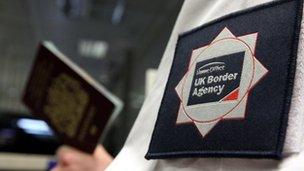Capita gets contract to find 174,000 illegal immigrants
- Published

The UK Border Agency is under pressure to clear removal backlogs
Services company Capita has won a government contract to help find and remove more than 150,000 migrants who have overstayed their visas, it has been revealed.
The payment-by-results deal is worth up to £40m, chief executive of the UK Border Agency Rob Whiteman told MPs.
He was unable to tell MPs what target the company had been set for removals.
The 174,000 have been denied permission to stay in the UK but have gone missing.
The existence of this backlog - dubbed the "migration refusal pool" - was revealed in July when the new chief inspector of immigration, John Vine, discovered it during his first inspection of a local immigration team, when it stood at 150,000. Since then it has grown to 174,000 people, the home affairs committee was told.
The then immigration minister Damian Green promised that the pool, which dates back to 2008 when officials began counting it, would be cleared quite quickly.
Enforcement
But Mr Whiteman said it would never be entirely cleared as it was constantly being added to by people denied the right to remain in the UK.
"It could not be zero, otherwise it would mean we are not doing any work," Mr Whiteman told the home affairs committee.
He said Capita, who beat three other companies including Serco to the contract, would be paid by results - but rejected a suggestion by Mr Vaz that the company would be "laughing all the way to the bank" after apparently being awarded a contract with no performance targets.
"Capita will be paid for the number of people they make contact with, and leave, and that's purely on a payment by results basis. If nobody leaves because they make contact with them, nobody will get paid."
He added: "The potential value of the contract if they perform very well over a four year period would be £40m."
He told MPs that 20% of missing migrants left the country within six months of being contacted during a pilot project - and that Capita would not solely be in charge of removals.
But he also revealed that he did not know how many of the 174,000 missing illegal immigrants had returned to their country and how many still remained in the UK, adding: "We have to do the work."
But he said he wanted to redirect more staff into enforcement to increase removals from its current level of 40,000 people a year.
Labour called for greater transparency over the contract with Capita, which describes itself as the leading provider of outsourced services to central government, including the administration of public sector pensions and, with ATOS, the controversial £540m disability benefit testing regime.
'Value for money'
Shadow immigration minister Chris Bryant said: "The whole point of a payment by results contract is that you define success for it before it starts.
"UK Border Agency has revealed that Capita will get £40m from the taxpayer if meets its targets, but UKBA doesn't seem to have any idea of what would constitute a success.
"In a time of austerity, the UKBA and the home secretary should be able to demonstrate that they are providing value of money to the taxpayer.
"The details of the contract and the tender process should be as transparent as possible; and at the very least, the chief executive of the UK Border Agency should be in a position to define what exactly a successful programme by Capita would look like. I urge the home secretary to provide the public with the details."
In other evidence to the home affairs committee, Mr Whiteman revealed that 26 charter flights carrying asylum seekers last year had more immigration staff on board than deportees.
He said this figure was down from 40, four years ago and, while accepting more savings could be made, he said removing "disruptive" asylum seekers was sometimes extremely difficult and took two or three attempts.
He also defended £25,000 of bonuses given to senior managers at the UK Border Agency this year, saying it was in line with civil service pay rules. He said he had turned down his own bonus due to the poor performance of the organisation in not clearing backlogs.
Mr Vaz said his committee "do not think it acceptable that people should given bonuses... until this organisation is fit for purpose".
- Published18 September 2012
- Published23 July 2012
- Published12 September 2012